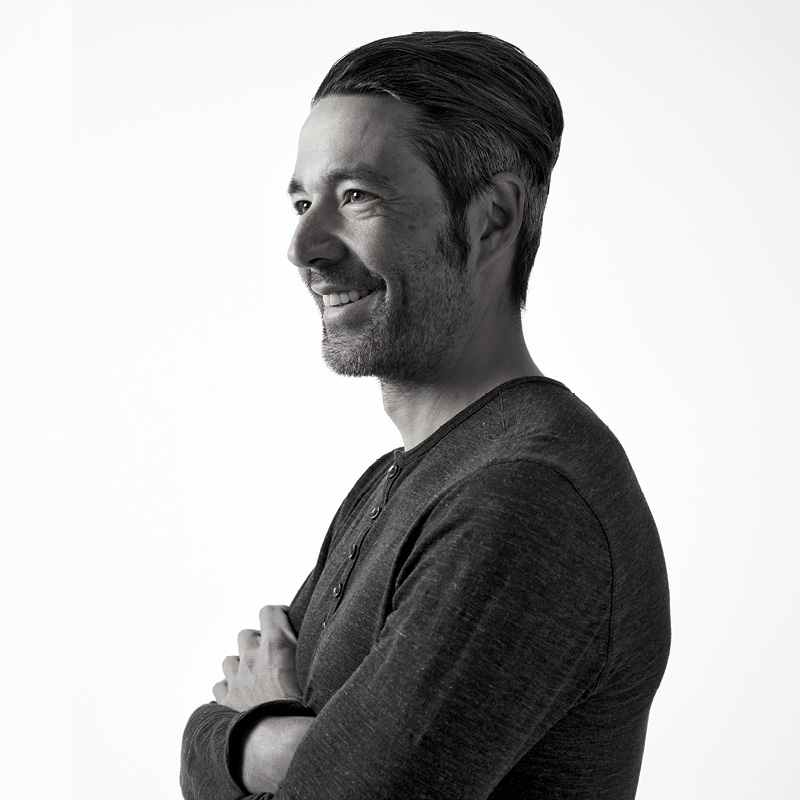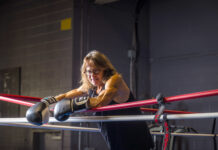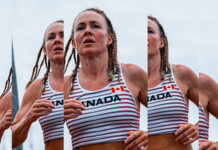As his vision deteriorated at the age of 18, cross-country skier Brian McKeever thought his days as an athlete were over. Boy, was he wrong. At 39, still going strong after five Paralympic and Olympic Games, it appears those days may never end. He has 17 Paralympic medals – a record 13 gold, 19 world championship titles – and a home in Canmore, AB, which he’s filled with race baubles.
With a seemingly infinite aerobic battery, McKeever is Canada’s most decorated athlete. He lives and competes with limited vision due to a hereditary degenerative eye disease that also afflicts his father. Brian was diagnosed with a variant of Stargardt Disease just as he embarked on his first international competition, the 1998 World Junior Nordic Championships in Switzerland.
“At 18, I’m not sure I really understood what was happening. I was bawling in my room thinking how my life was going to change. It was overwhelming. Just as I was ready for my first international competition, I thought my career as an athlete was done,” he says. “It was a knee-jerk reaction, but I got over it much quicker with Dad (Bill McKeever) as a role model.”
“Blindness was normal in our house. Dad was a blind phys-ed teacher so I never saw blindness as an obstacle, but adopted more of a self-deprecating humour about it all. On occasion, I do make a blind-guy mistake…”
McKeever has about 10 per cent normal vision, mostly in the periphery. He can read large fonts on his smartphone at very close range, but he describes his everyday vision as seeing “just the donut, not the hole.” For training and racing, he follows the forms of the guides who ski in front of him.
“There’s not a day that goes by where I don’t think, ‘it would be easier if …’ Of course I think about blindness, but I’ve never cursed it,” he says. “Blindness has made me who I am and, for the most part, I like who I am.”
[caption id="attachment_967" align="alignnone" width="1068"]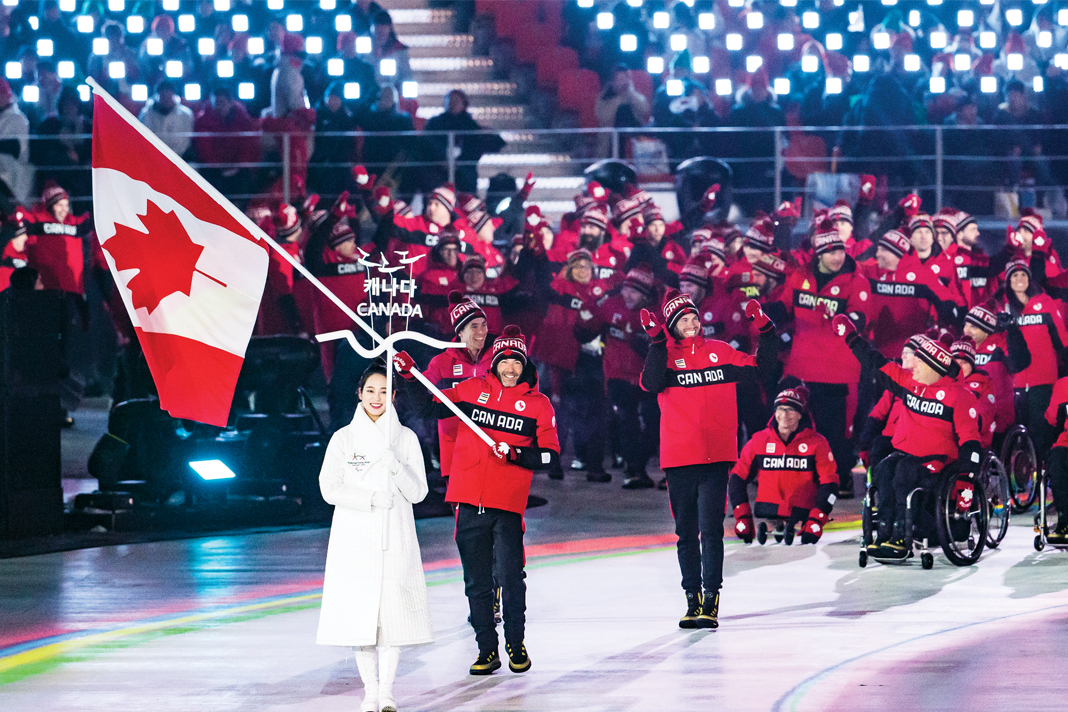 Brian McKeever leads the Canadian team as the flag-bearer for the 2018 PyeongChang Paralympics opening ceremony.[/caption]McKeever is an athlete first and foremost with a life in perpetual motion and a routine of gliding on snowy tracks or training on roller skis, every day for three to five hours. Upper body strength is much more important today because of double-poling technique. Instead of time in the gym, he adds in long trail runs and enjoys adventures like bouldering and rock climbing.
Brian McKeever leads the Canadian team as the flag-bearer for the 2018 PyeongChang Paralympics opening ceremony.[/caption]McKeever is an athlete first and foremost with a life in perpetual motion and a routine of gliding on snowy tracks or training on roller skis, every day for three to five hours. Upper body strength is much more important today because of double-poling technique. Instead of time in the gym, he adds in long trail runs and enjoys adventures like bouldering and rock climbing.
An odds-on favourite virtually every time he toes a start line, one of McKeever’s most famous races came in the one-km sprint at the 2014 Olympics in Sochi, Russia. McKeever battled back to win gold after getting tangled up with another racer and falling early in the race. He’s also notable for a race he did not ski at the 2010 Vancouver Olympics. McKeever hoped to become the first athlete to compete in the same Olympic and Paralympic Games after winning the Canadian team’s 50 km Olympic trials. But, much to McKeever’s disappointment, Canadian coach Inge Braten chose four other skiers for the Olympic marathon, denying McKeever the option to race.
At 37, in PyeongChang, South Korea, McKeever won the 1.5 km sprint, 10 km and 20 km races to become Canada’s most decorated Winter Paralympian. He also won relay bronze with teammate Collin Cameron, a sit-skier. He has no plans to slow down and wants to compete in Beijing in 2022 and perhaps 2026 as an athlete or coach should the Winter Games be awarded to Calgary.
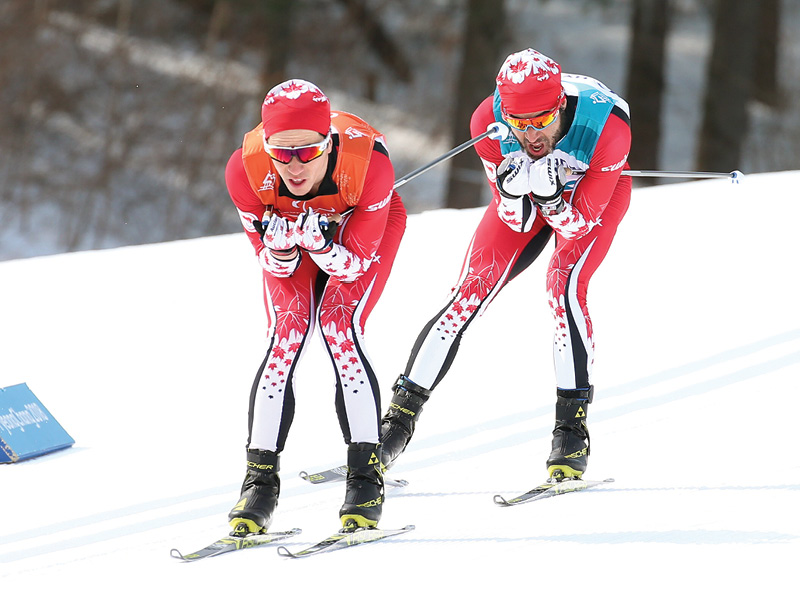
McKeever is so proficient at his sport, he skis ultra-marathon distances without a guide. At the 220 km Nordenskiolds Loppet in Sweden (2017), he placed 12th in a near 12 hours against an able-bodied field of professional skiers. Ninety-km and fifty-km races are a staple of his competition schedule.
“It’s not about chasing medals — even the best athletes lose much more than they win —it’s about the training, the process, and the ability to have your best performance on any given day.”
– Brian McKeever
“I’ve changed a lot over the years. It’s not about chasing medals – even the best athletes lose much more than they win – it’s about the training, the process, and the ability to have your best performance on any given day,” he says. “I don’t see myself slowing down anytime soon. As long as I’m fit, fast and mentally ready, I will continue to compete.”
If he, or anyone else, ever doubted McKeever’s athletic prowess, any Paralympic asterisk was erased when he was recently recognized as Male Athlete of the Year for winter sport performance at the Canadian Sport Awards. He was selected over long track speed skater Ted-Jan Bloeman, short track speed skater Samuel Girard, and moguls skier Mikael Kingsbury, all Olympic gold medallists in PyeongChang.
Brian’s brother Robin McKeever, who’s been head coach of the Canadian paranordic team since 2010, was his guide from 2001-2010.
“Brian was willing to work harder and train harder than any other athlete. He wants to keep improving almost to a fault. He takes it to a different level than any of us are capable of,” says Robin. “Even as he gets older, his aerobic capacity has remained the same or improved. Over the past eight years he’s developed more power.”
Brian is a big booster for another Calgary Olympics, declaring he is “a product of the ’88 Games,” when his big brother tested the Olympic race courses as a forerunner. Just as he was inspired to compete, he is hopeful he can help young athletes step up for another Canadian Games.
With respect to winning in 2026, Robin contemplates. “There’s competitive and then there’s winning. It depends on who else comes through the grapevine. Brian wouldn’t be competitive if another Brian comes along who was 15 years younger, but it is possible,” says Robin. “If his physical and mental health holds up, I believe it’s still possible and that he’s on the podium in 2026.”
As he strokes his greying goatee, McKeever describes himself as “an old-man athlete” and talks about helping young athletes grow in the Nordic ski world. He envisions the next stage in his career as a coach or technique consultant and following that, a time when racing isn’t his focus – but not just yet.
Brian McKeever, 39
- Born: June 18, 1979, Calgary, AB
- Resides: Canmore, AB
- 5-foot-10, 150 pounds
- Para Nordic Skier
13-time Olympic Champion
19-time World Champion


